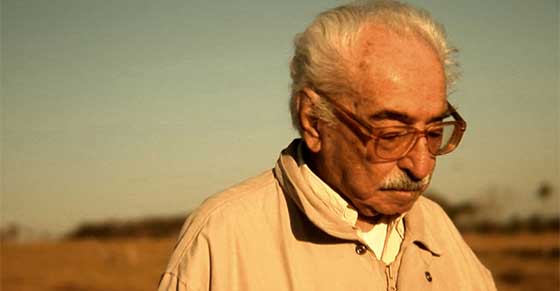Manoel de Barros began writing poetry at the age of thirteen. For the next eighty years, until his death on November 13, 2014, at ninety-eight, he wrote of the wetlands like no other Brazilian poet before him or since. He invented a language to speak not for his own experience of the wetlands but for how the birds experienced it. He wrote of the world as seen by the ants and of the music heard at the bottom of the river and of a humbleness before nature that was not of a poet who visited for a weekend or a month to escape urban life but of a poet who was born into a lush green place and felt himself to be such a part of it that he never lived anywhere else.
Translating his poems dramatically changed my thinking about the relationship between nature and language. For Manoel de Barros, nature and language were one and the same. He sought words that were the birds and therefore “belonged to no language.” As we lose species after species to human destruction, Manoel de Barros speaks for what we are losing with a swiftness that it is nearly unfathomable. – Idra Novey
Small World
My world is small, Lord.
There is a river and a few trees.
The back of our house faces the water.
The ants trim Grandmother’s rose beds.
In the backyard, there is a boy
and his wondrous tin cans.
His eye exaggerates the blue.
Everything from this place has a pact
with birds.
Here, if the horizon reddens a little,
the beetles think it’s a fire.
Where the river starts a fish,
river me a thing
River me a frog
River me a tree.
In the evenings, an old man plays his flute
to invert the sunsets.
Publication Date: 1993
The Use of Materials and Birds for a Demolition
Walk No. 1
After getting together with Alyosha Karamazoff
I leave behind the dead house
With my feet, I try to find the little things
on the ground near the ocean
In my mouth a deafness
I exhibit the traits of a fruit fly
Walk No. 2
A man (lone as a bridge) was seen
from the veranda by a group of fools
A tree was growing in his voice
And his face was an open field
Walk No. 3
Thrush roots and moss
climb up the walls
It wasn’t normal
the lizard feeling he found in the word walls
Walk No. 4
A man saw himself: only his outer side climbing
up a ladder…
Paths the devil didn’t knead—he said.
The clock ran behind.
He saw a little scrub grass invading the ruins of his mouth.
Walk No. 5
Hovels in ruins
cracks
in the walls
And the slug—in its freedom
to go about naked and damp!
Publication Date: 1970
Mundo Pequeno
O mundo meu é pequeno, Senhor.
Tem um rio e um pouco de árvores.
Nossa casa foi feita de costas para o rio.
Formigas recortam roseiras da avó.
Nos fundos do quintal há um menino e suas latas
Maravilhosas.
Seu olho exagera o azul.
Todas as coisas deste lugar já estão comprometidas
com aves.
Aqui, se o horizonte enrubesce um pouco, os
besouros pensam que estão no incêndio.
Quando o rio está começando um peixe,
Ele me coisa
Ele me rã
Ele me árvore.
De tarde um velho tocará sua flauta
para inverter os ocasos.
Aproveitamento de materiais e passarinhos de uma demolição
PASSEIO Nº 1
Depois de encontrar-me com Aliocha Karamazoff,
deixo o sobrado morto
Vou procurar com os pés essas coisas pequenas do
chão perto do mar
Na minha boca estou surdo
Dou mostras de um bicho de fruta.
PASSEIO Nº 2
Um homem (sozinho como um pente) foi visto da
varanda pelos tontos
Na voz ia crescendo uma árvore
Aberto era seu rosto como um terreno
PASSEIO Nº 3
Raízes de sabiá e musgo
subindo pelas paredes
Não era normal
o que tinha de lagartixa na palavra paredes
PASSEIO Nº 4
O homem se olhou: só o seu lado fora subindo
a ladeira…
Caminhos que o diabo não amassou – disse.
Atrasou o relógio.
Viu um pouco de mato invadindo as ruínas de
sua boca!
PASSEIO Nº 5
Casebres em ruínas
muros
escalavrados…
E a lesma – na sua liberdade de ir nua
úmida!
***
Manoel de Barros, author of more than twenty collections of poetry, was born in the swamp region of Brazil known as the Pantanal in 1916. He received Brazil’s highest award for poetry, the Jabuti Prize, in both 1990 and 2002, the Nestle Poetry Prize in 1997 and 2006, and the Ministry of Culture’s Cecilia Meireles Prize in 1998.
Idra Novey is the author most recently of Clarice: The Visitor, a collection of poems and images in collaboration with the artist Erica Baum. Her debut novel Ways to Disappear is forthcoming from Little, Brown in 2016. Earlier poetry collections include Exit, Civilian, selected by Patricia Smith for the 2011 National Poetry Series, and The Next Country, a finalist for the 2008 Foreword Book of the Year Award in poetry. Her work has been featured on NPR’s All Things Considered, the Leonard Lopate Show, in Slate, The Paris Review, A Public Space and Poetry. She’s received awards from the Poetry Foundation, the Poetry Society of America, the National Endowment for the Arts, Poets & Writers Magazine, and the PEN Translation Fund. Her most recent translation is Clarice Lispector’s novel The Passion According to G.H. She teaches in the Creative Writing Program at Princeton University.
Excerpts courtesy of Carnegie Mellon University Press
Read more from Brazil:

